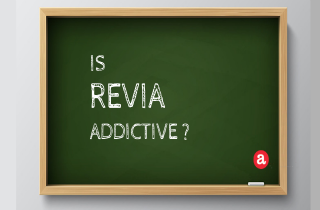No, Revia is not addictive.
In fact, people who are eligible to use it do not develop dependence on the medication or experience withdrawal symptoms when treatment is discontinued. Revia works in quite the opposite way, and actually helps alcoholics and opiate/opioid users in the process of getting sober and staying substance-free.
If you want to learn more about the course of treatment for alcohol and opiate addiction with Revia, continue reading here. If you have any additional questions at the end, please send them via the comments section. We try to answer all legitimate inquiries personally and promptly.
What is Revia?
Revia is a brand name for the opioid antagonist drug, “naltrexone hydrochloride“. The brand name medication comes in 50mg pills, which are beige, round, biconvex, film-coated, scored tablets. It blocks the pleasurable effects that alcohol and opiate based drugs (natural and synthetic) produce and also helps relieves cravings for these substances. It does this by binding mostly in the mu-opioid receptor, but also binds to the k-opioid receptor and delta opioid receptor in the brain.
What is Revia used for?
Revia is prescribed and used as a part of a complete addiction management and treatment program. It’s important that patients completely stop using alcohol or opiate drugs before Revia treatment is initiated because of the adverse counter-reactions. When a doctor gives clearance and patients start taking Revia, it can help them manage cravings and lower the risk of relapse. More specifically, Revia can help:
- Alcohol dependent patients who have succeeded in abstaining from alcohol for some time (at least 7-10 days).
- People who are opiate/opioid-dependent but have stopped using illicit or prescription drugs for 10-14 days.
Revia for alcohol dependence
Revia works by blocking the chemical responses that make alcohol rewarding. By acting in such way, it provides people in alcohol recovery with the needed physical support to stay focused on completing a comprehensive recovery program: namely, to do the work of psychotherapy. The usual adult dose is on 50mg tablet per day and treatment usually lasts 3 months, but may be longer if needed. The duration of Revia treatment really depends on how quickly you adapt to recovery as individual risk factors for relapse.
Revia for opiate or opioid drug dependence
Revia can also help recovering opiate addicts stay drug-free. Revia should be prescribed and used as a part of an overall program that may include family or individual counseling, support groups, cognitive-behavioral therapy, educational sessions, lifestyle changes, adequate support system and other treatments that fit patient’s needs.
The initial dose for the treatment of opioid dependence is 50mg Revia, but doses may vary according to the way patients react to therapy and according to the dosing schedule. Revia stays in your system for up to 24 hours, but is not often subject to drug testing. Some examples of doses of Revia for opioid/opiate addiction include:
- 50mg of Revia taken every day
- 100mg of Revia taken every other day
- 150mg of Revia taken every third day
Deciding to take Revia
The final decision to use Revia should be made along with your doctor or counselor, and only after a careful assessment of your physical and mental health state. We have put together the following list of benefits and risks from Revia to help you make up your mind:
Who CAN take Revia?
1. Highly motivated patients, who are dedicated to their recovery
2. Individuals who have tried to stay substance free before, but cannot remain sober and keep relapsing
3. People who experience strong alcohol or drug cravings when you try to quit
4. Patients who have stayed away from alcohol and drugs for at least a week and are no longer experiencing acute withdrawal symptoms
5. Sober individuals who are looking for a non-addictive medication that can assist their sobriety
6. Patients who were examined by a doctor and have no vital organ injury
Who SHOULDN’T take Revia?
1. Alcohol-dependent individuals who are still drinking, and opiate-dependent patients who are still taking their drug of choice (prescription or illicit)
2. Mothers who are pregnant or are breastfeeding an infant
3. People with a history of allergic reactions to any of the ingredients that Revia contains
4. Patients who are taking other opiate-based medications or certain pain killers (you should inform your doctor about all medicines you use)
5. Individuals diagnosed with hepatitis, liver failure, kidney damage, or any other liver or kidney disease
6. All patients who have failed the “Narcan” challenge test that determines if all opiates have been eliminated from your system, or not
Naltrexone questions
Are you or a loved one suffering the cruelty of alcohol or drug cravings? Maybe Revia can help you. We advise you to speak to your doctor or treatment provider if you may be eligible to use Revia.
For any other questions or uncertainties, feel free to contact us. You can post your comments in the section below and we’ll try to provide you with a personal and prompt response.









Related Posts